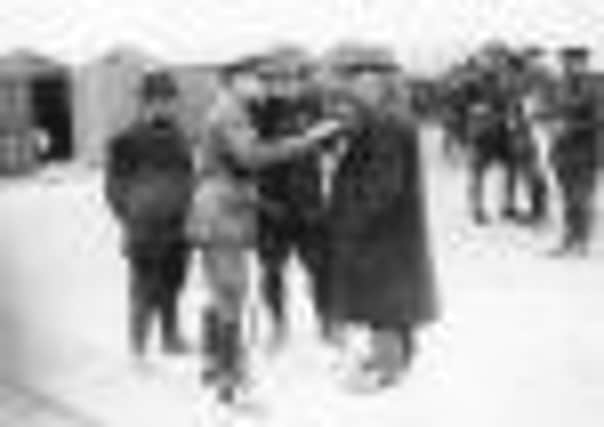Scotsman archive, 12 November 1918: “End of all wars” - Prime Minister’s Hope


SPEECH IN THE HOUSE OF COMMONS.
When the SPEAKER, in his robes of black and gold, took the Chair at a quarter to three o’clock yesterday afternoon the House was crowded, the attendance being the largest since the early days of the war. The Chancellor of the Exchequer (Mr Bonar Law), and the Foreign Secretary (Mr Balfour) came in immediately after prayers were heartily cheered.
A second or two later the Prime Minister entered, and there was a long outburst pf cheering. Members rose to their feet and waved handkerchiefs and order papers. No questiona were asked, and none of the usual formal business was transacted.
Advertisement
Hide AdAdvertisement
Hide AdThe PRIME MINISTER rose and announced the terms of the armistice, and on his arising the cheering was again renewed. He said:— The armistace, as has been already announced in the Press, was signed this morning at five o’clock, after a discussion which was prolonged all night. I will read to the House the conditions of tho armistice in so far as they have reached us up to the present. I ought to warn the House and the public that we have only received by telephone such corrections as were tendered necessary by the new conditions, and I have been correcting them up to the latest moment. There is a possibility that there may be a few mistakes, but substantially these will represent the conditions which Germany has accepted.
Mr. Lloyd George then proceeded to read the terms of the armistice. Referring to the conditions on which the vessels of the Auxiliary Fleet are to be disarmed, the right hon. gentleman said:— In consequence of recent events — I have just had it by telephone — this has to be added — a declaration has been signed by us — this comes from Admiral Wemyss — and handed to the German delegates to the effect that, in the event of ships not being handed over owing to the mutinous state of the Fleet, the Allies reserve tho right to occupy Heligoland as an advance base to enable them to enforce the terms of the, armistice. The German delegates have on their part signed a proclamation that they will recommend the Chancellor to accept this, (Cheers.)
Having finished reading, the Prime Minister said:— These are the conditions of the armistice. Thus, Mr Speaker, at 11 o’clock this morning came to an end the cruellest and most terrible war that has ever scourged mankind. I hope we may say that thus this fateful morning, came to an end all wars. (Cheers.) This is no time for words. Our hearts are too full of gratitude which no tongue can give adequate expression to. I will, therefore, Mr Speaker, move that the House do immediately adjourn until this time tomorrow, and that we proceed as a House to Commons to St Margaret’s to give humble and reverent thanks for the great deliverance of the world from its great peril. (Cheers.)
Mr Asquith (L., Fife, E.) said:— I am sure the House without any distinction or difference of opinion will agree with the motion that the Prime Minister has made, and that, the course which he proposes to adopt is the only one which is consonant with our feelings and those of the country and of the Empire. With regard to the terms of the armistice which were read out, I will simply say this — It is clear from them and their acceptance by our enemies that not only is the war at on end, but that it cannot be resumed. ‘ (Cheers.) I join with a full heart in his aspiration that not only will this war not be resumed, but that we are now entering upon new chapter of international history in which war will be recognised us an absolute anachronism never to be repeated. As the Prime Minister has said, there is nothing we can do under conditions so unexampled than for the House, on behalf of the nation, to acknowledge our gratitude to the Almighty God.- ; (Subdued cheers.)
The SPEAKER, in moving that the House do now adjourn, said— I propose that we should at once proceed to St Margaret’s Church, and I invite the House to follow, very much in the same order as on tho 4th of August last. I will go first with the Mace, and invite the Privy Councillors in fours, so far as may be in order of precedence to follow, and then the rest of the House can fall in behind.
The House then adjourned. Tho Speaker, preceeded by the Sergeant-at-Arms carrying the Mace, was immediately followed by the three Clerks. The Prime Minister, with the Deputy Speaker (Mr Whitley) on his right and Mr Asquith on his left, came next. Mr Bonar Law, Mr Balfour, and Mr McKenna walked together.
• Sign up for access to the Scotsman Archive at archive.scotsman.com